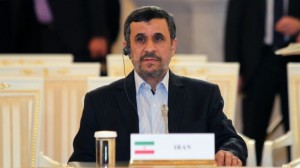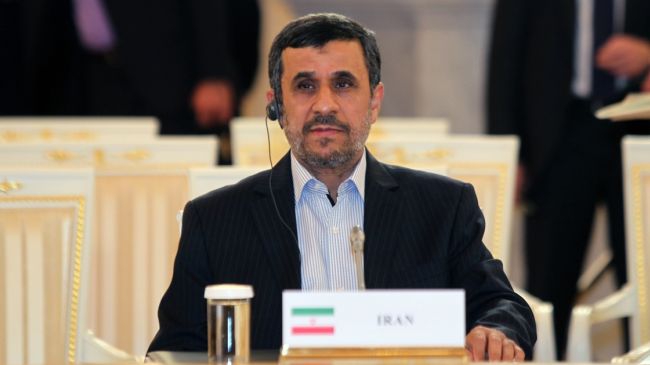 Iranian President Mahmoud Ahmadinejad attends the 2nd summit of the Gas Exporting Countries Forum (GECF) in Moscow, Russia, on July 1, 2013.[/caption]
Iranian President Mahmoud Ahmadinejad attends the 2nd summit of the Gas Exporting Countries Forum (GECF) in Moscow, Russia, on July 1, 2013.[/caption]Iranian President Mahmoud Ahmadinejad has called on gas producers to define pricing mechanisms in a bid to set fair prices for this vital source of energy.
ďClear pricing mechanisms for different types of gas should be defined, approved and jointly implemented,Ē Ahmadinejad said in an address to the 2nd summit of the Gas Exporting Countries Forum (GECF) in Moscow on Monday.
ďFair price and supply of different sources of energy especially gas will tackle inequalities and prepare the grounds for the elimination of opportunism and dominance,Ē he added.
Ahmadinejad urged exchange of technical and executive experience among the GECF members in the fields of gas recovery, refining and conversion as a ground for constructive and joint cooperation.
ďJoint investment and cooperation in [gas] exploration and production should be increased among [GCEF] members and a plan should be envisaged to help countries poor in fossil energy through working out a clear mechanism,Ē Ahmadinejad stated.
He added that energy, particularly fossil energy, is the most important economic factor in the world which plays a determining role in the regulation of market and even in strategic and international policymaking.
The Iranian president said that some countries are trying to seize the worldís mines and resources and impose their desired prices on the global market through unilateral sanctions and political pressure.
He noted that GECF countries are in possession of huge resources of energy, particularly gas, and called for ďglobal and targeted collaborationĒ to restore their nationsí rights.
The Iranian president arrived in Moscow on Monday to partake in the 2nd GECF summit and hold talks with foreign counterparts including Russian President Vladimir Putin.
GECF, whose first ministerial meeting was held in Tehran in May 2001, is an intergovernmental organization comprising 13 of the world's leading natural gas producers, namely Algeria, Bolivia, Egypt, Equatorial Guinea, Iran, Libya, Nigeria, Oman, Qatar, Russia, Trinidad and Tobago, the United Arab Emirates and Venezuela. The observer states include Kazakhstan, Iraq, the Netherlands and Norway.
GECFís potential rests on the enormous natural gas reserves of its member countries, which account for some 62% of the worldís proven natural gas deposits.
By Press TV
The Iran Project is not responsible for the content of quoted articles.











